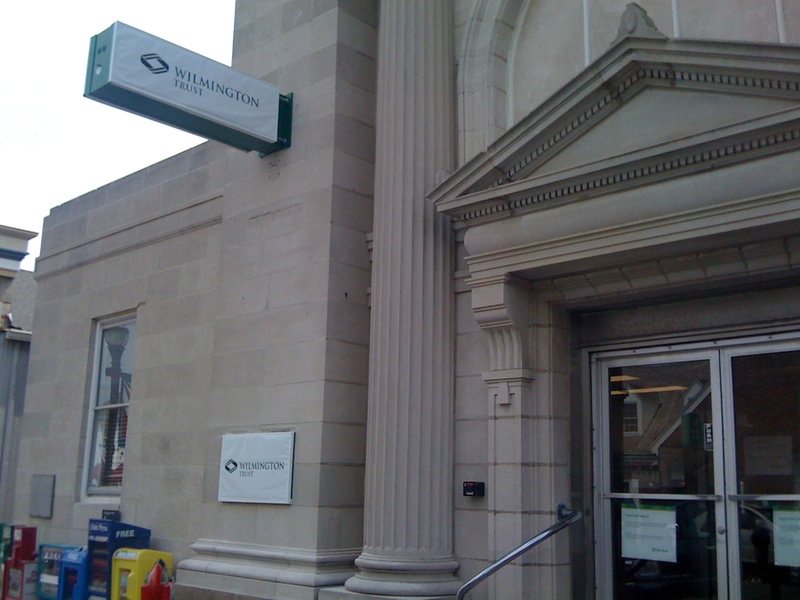Class-action lawsuit: Wilmington Trust lied to shareholders
A Dover developer faces criminal charges, and Wilmington Trust Bank – now owned by M&T Bank – is fighting a class-action lawsuit, all related to the bank’s process of doling out loans.
The Federal Bureau of Investigation began probing the relationship between Wilmington Trust and developer Michael Zimmerman after retired Sen. George Bunting, D-Bethany Beach, wrote a series of letters, beginning Oct. 14, 2010, asking the Federal Reserve to investigate the bank’s commercial loan practices.
Wilmington Trust provided financing for a number of Zimmerman’s projects, including Salt Pond Plaza in Ocean View and two other projects in Dover.
Zimmerman has facilitated shopping centers, drug stores, grocery stores and residential centers in Sussex County, including Zwaanendael Landing in Lewes, Walmart in Georgetown, Long Neck Plaza and Milton Park Center. Zimmerman could not be reached at press time.
The U.S. Attorney General’s Office filed an indictment against Zimmerman Jan. 23, which included felony charges of conspiracy to commit bank fraud, making false statements to a financial institution and money laundering.
Wilmington Trust shareholders, who were already suing the bank, filed an amended complaint Jan. 9. The shareholders accuse Wilmington Trust of securities fraud, which, they say, caused the demise of the 107-year-old bank as an independent institution.
The lawsuit says Wilmington Trust was sold at M&T Bank at a fire-sale price equal to half the price at which its shares were trading.
According to the suit, the bank’s senior officers, including Chief Executive Officers Ted Cecala and Donald Foley, Chief Financial Officer David Gibson, President Robert Harra and Chief Credit Officer William North, encouraged loan officers to close loans, even if they thought borrowers would be unable to repay them. Many of the accusations in the suit are credited to a number of confidential witnesses who worked at Wilmington Trust.
“Indeed, according to these witnesses, almost 75 percent of the bank’s loans received ‘essentially no review’ by the credit review department, which was supposedly responsible for evaluating the performance of the bank’s loans,” the lawsuit reads.
Lead plaintiffs in the class-action suit include Merced County Employee’s Retirement Association, Coral Springs Police Pension Fund, St. Petersburg Firefighters’ Retirement System, Pompano Beach General Employees Retirement System and Automotive Industries Pension Trust Fund.
According to the suit, “The bank’s underwriting deficiencies – and the disastrous relationship with Zimmerman – arose out of policies instituted by Defendants Cecala, Harra, and Gibson that favored extending a high volume of loans to customers based on the clients’ ongoing or potential relationships with the bank, rather than on an evaluation of their creditworthiness.”
The suit says the Federal Reserve Board and internal and external auditors criticized Wilmington Trust’s lax lending culture as early as 2007. “Notwithstanding these repeated warnings, the officer defendants did nothing to remedy these problems,” the suit states.
Wilmington Trust initiated a comprehensive analysis of its lending practices in Delaware in 2009. According to the lawsuit, the completed review expressed concerns with past management of the Delaware Commercial Real Estate Division, which was summarized in a March 12, 2010 memo, the Delaware Review Memorandum.
The memo gave specific examples of the bank giving multimillion-dollar loans to developers, who then pocketed the money, including Zimmerman. “The bank’s loans to this single developer alone totaled $90 million in March 2010, constituting almost 6 percent of the bank’s entire commercial construction loan portfolio,” the suit says.
In one instance, the suit says, Zimmerman sent a fax to the bank in January 2008, which read, “Send $1,000,000 ASAP I have to pay my bar tab.”
Five days later, Wilmington Trust wired Zimmerman $1 million as an equity payout, the suit states; the fax was kept in the bank’s Salt Pond loan file.
Zimmerman was arrested last month, Jan. 25. He was then released Jan. 28, and ordered to appear in court at 1 p.m., Thursday, Feb. 21, at the Federal Courthouse in Wilmington.
The indictment against Zimmerman, authored by Assistant U.S. Attorneys Robert Kravetz and Lesley Wolf, relates to three of Zimmerman’s Delaware projects – one in Ocean View and two in Dover.
Kravetz and Wolf claim Zimmerman borrowed more than $12 million from Wilmington Trust to fund the Salt Pond Plaza project in Ocean View. Zimmerman built the project under the Salt Pond Plaza LLC, of which he owned the majority share.
Wilmington Trust sold the debt associated with Zimmerman’s developments to a third party on March 30, 2011, the indictment says. “Both in connection with the sale and prior to this time, the bank incurred a loss on the three Zimmerman-related projects in excess of $26 million,” Kravetz and Wolf state. Nearly $10 million was lost on the Salt Pond project.
Zimmerman’s conspiracy charges relate to requests to pay for architectural and engineering services that were not actually performed. A July 8, 2007 request for $357,500 was taken from the bank to pay for what the indictment called soft costs; instead, a check was written to Zimmerman for $309,800. The remaining funds were paid to Zimmerman’s Salt Pond partner Kevin Barrett, who owned an 11 percent share of Salt Pond LLC, and Zimmerman’s company, BBC Properties.
The attorneys cite five similar requests for the Salt Pond project and three similar requests for Zimmerman’s two Dover projects.
“At minimum, the fraudulent draw requests for the three projects totaled approximately $1.25 million,” attorneys say.
According to the class-action lawsuit against Wilmington Trust, “The bank eventually wrote off nearly half of its loans to Zimmerman, costing the bank over $43 million – or 10 times the bank’s net loss for all of 2009.”
Wilmington Trust announced it would be sold to M&T Bank in November 2010.
“On the news of the merger – which the New York Times termed 'one of the biggest so-called take-unders in recent Wall Street memory' – the price of Wilmington’s stock collapsed 46 percent, causing massive losses to investors,” the suit says.
The lead plaintiffs ask for a jury trial and demand monetary compensation for themselves and the class members. The suit does not specify the amount plaintiffs wish to be compensated.














































